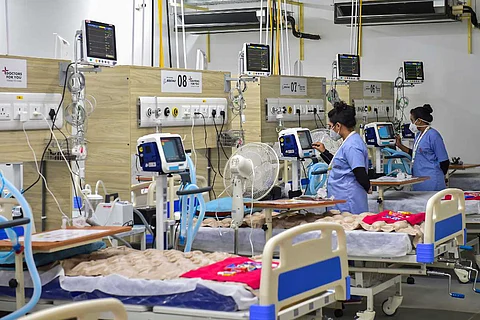AIIMS report says only 3-5% of hospital beds available for emergency care
The number of beds available at emergency departments accounted for only 3-5% of total hospital beds in the country, says a report that accessed the prevailing status of 100 emergency and injury care centres in government and private hospital settings. The report titled 'Emergency and Injury Care at Secondary and Tertiary Level Centres in India', prepared by the Department of Emergency Medicine, AIIMS was submitted to NITI Aayog. The report assessed the prevailing status of 100 emergency and injury care centres in government and private hospital settings in 28 states and 2 union territories of India, in addition to 34 district hospitals.
As per the report, most of the hospitals lacked presence of general doctors, specialists and nursing staff dedicated for emergency departments vis-a-vis the average footfall of patients, even though the hospitals as such, had sufficient overall numbers of required human resource.
Amongst the critical infra-related quality parameters assessed in the emergency departments (EDs), the following were important deficiencies: absence of point of care lab (73%), demarcated triage area (65%), police control room (56%), separate access for ambulance (55%) and adequate spacing for emergency department (52%).
The report said, emergency and injury cases annually accounted for 9-13% of all patients presenting to a health facility, and 19-24% of admissions in government hospitals and 31-39% admissions in private hospitals.
Emergency care can be defined as the delivery of time-sensitive interventions needed to avert death and disability and for which delays of hours can worsen prognosis or render care less effective.
The report noted that while compliance with availability of overall recommended biomedical equipment and critical equipment were largely found satisfactory at all private hospitals (86-93%) and government medical college hospitals (68%), deficiencies were found largely in smaller government hospitals (45-60%).
Noting that since it is essential to have the complete list of all recommended emergency medicines 24*7 in the emergency departments, the report said assessment done for this aspect revealed that only 9% of all hospitals fulfilled this criterion.
According to the report, many government medical colleges lacked common HDU or high dependency units (55%), Cardiac ICU (55%) and Neuro ICU (55 %). In addition, they also lacked facilities for Coronary Artery By-pass Graft (55%), Cardiac Cath Labs (30%) and interventional radiology (40%), it said.
The report pointed out that most of the hospitals did not have a dedicated blood bank in the emergency department, nor an existing standard protocol for massive blood transfusion. It also said that the patient disposition time for the sickest group (red zone) was high at government medical colleges (90 minutes) vis-a-vis private hospitals (15 minutes).
The reasons for this delay amongst others were due to: high patient load, lack of in-house specialists in the ED, need for multiple cross referrals, with an overarching lack of a dedicated department for emergency services, it added.
While 91% of hospitals had in-house ambulances, the report said trained paramedics needed to assist ambulance services were present only in 34%.
The report pointed out that only 19% of hospitals had a mobile stroke/STEMI (for heart attack) program, with only 4% having a mobile stroke unit. Specifically, equipment deficiencies pertained largely to the category of pediatric care (75%), equipment pertaining to Airway, breathing, circulation and general categories had deficiencies pertaining to a few sets of specific equipment (10-72%), it said.
Violence between relatives of the care-seekers and health care providers were noticed by 22-47% of hospitals, with higher representations from government hospitals, the report said.

